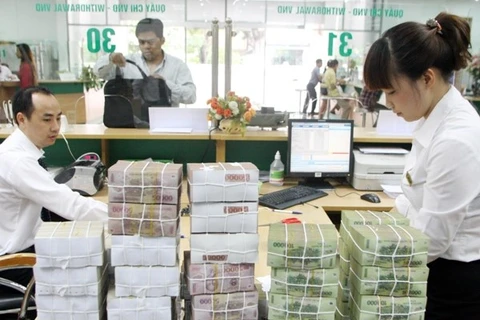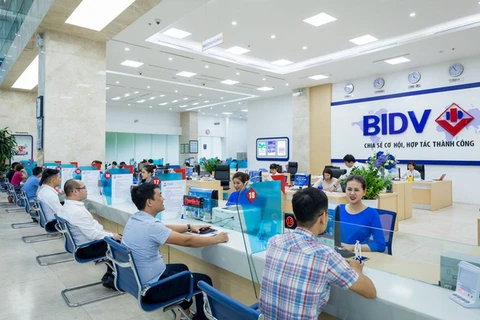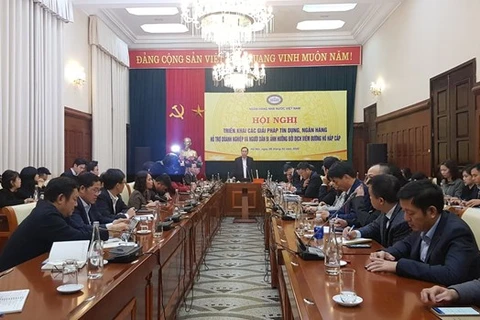
Hanoi (VNA) – The Ministry of Finance has submitted to the Government solutions to remove difficulties for production and business activities and support the market amidst the complicated developments of the COVID-19 outbreak.
The solutions are expected to contribute to maintaining macro-economic stability, as well as promoting and creating momentum for economic development. They include support on tax, land use fees and charges for enterprises and business households hit by COVID-19.
Term for tax and land lease payment extended
The Ministry of Finance said the term for tax and land lease fee payment, which is worth around 30 trillion VND (1.3 billion USD), has been extended in a support package for enterprises and business households hit by the COVID-19 outbreak.
The ministry added that it will work closely with relevant ministries and agencies to ask the government to promptly issue a decree on the extension of payment term of value added tax, individual income tax, and land lease fee for affected sectors such as tourism, transport, hospitality, garment and footwear.
The ministry’s proposal is based on Article 49 of the Law on Tax Administration. Article 49 sets out the extension of the tax payment time limit in case taxpayers are unable to pay their taxes on time due to exceptional difficulties according to the Government’s regulations.
Fees and charges reduced
The Ministry of Finance has coordinated with relevant ministries and sectors to review the Government’s proposal to reduce input fees for production and trade.
The ministry issued Notice No. 2155/BTC-CST on February 28, requiring ministries and ministry-level agencies to review fees associated with services under their management, and suggest reducing fees to support those affected by the outbreak.
Competent units have proposed a reduction in fees and charges to support and ease difficulties for those affected by the COVID-19 outbreak, sent documents the ministry, and coordinated with them to study and issue circulars as regulated or report to the Government and the Prime Minister if those documents are out of their authority.
The realisation of the support package is to take place as soon as the Government issues the decree, and end late this year.
During the Government’s meeting for February, the Prime Minister also agreed with the Finance Ministry’s proposal on a support package for enterprises and business households.
The General Statistics Office (GSO) released a report on February 29 highlighting the socio-economic impact in the first two months of the year. The report stated that the negative impact of the COVID-19 outbreak on industrial production activities has been relatively severe.
The country’s industrial production index expanded by only 6.2 percent in the first two months of the year, much lower than the 13.7 percent and 9.2 percent in the same period in 2018 and 2019, respectively.
The manufacturing and processing sector, specifically, grew by 7.4 percent, contributing 6 percentage points to the index. The electricity production and distribution sector expanded by 8.4 percent, while the water supply and waste treatment sector was up by 4.9 percent.
The mining sector posted a 3.7 percent decrease in growth. Other under-performing sectors included crude oil and natural gas exploitation, which were down by 8.6 percent, and wood processing and wooden furniture, which was down 5.2 percent.
Some sectors posted higher growth compared to the same period last year, such as metal ore mining, which was up 25.4 percent, and coke and refined petrol, which was up by 18.6 percent.
Over the past two months, nearly 16,200 enterprises suspended operation, an increase in 19.5 percent annually.
During this period, the number of newly-established firms rose 9.1 percent to 17,400 and those resuming operations were up 17.1 percent year-on-year to 11,900.
The new enterprises had a total registered capital of 220 trillion VND (956 million USD) and 157,500 workers, down 11.1 percent and 3.9 percent year-on-year, respectively.
About 5,700 businesses are registered to add 421 trillion VND to their capital.
In total, an additional 641 trillion VND was poured into the economy, down 26.2 percent from the same period last year.
Up to 9,400 businesses waited for dissolution procedures, which is down by 31.4 percent, and 2,800 others completed the procedures, down 11.1 percent./.























